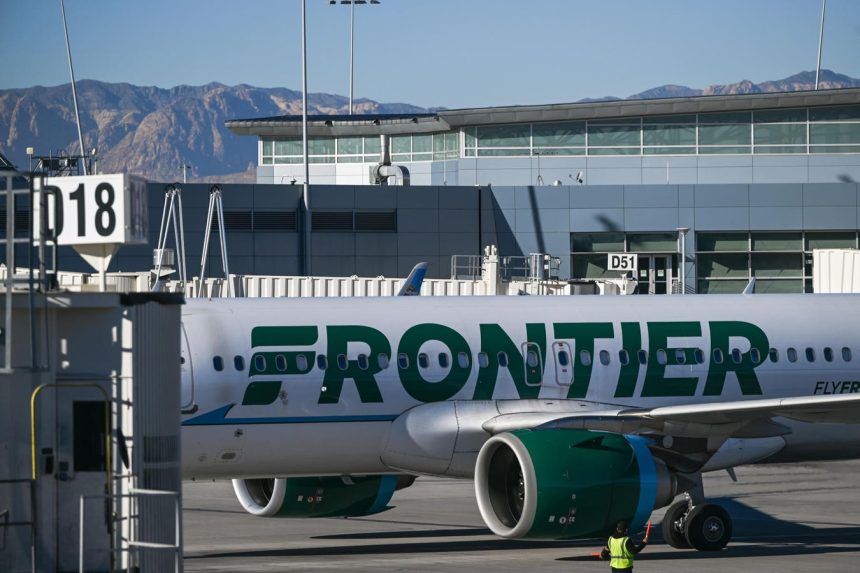Frontier Airlines, a low-cost carrier, has emerged as the unlikely frontrunner in the 2025 airline industry, confounding expectations and defying predictions of doom for the budget segment. Year-to-date, Frontier’s stock has soared by 16%, outperforming major U.S. airlines like Delta, United, and Alaska. This surprising performance stems from an optimistic January SEC filing, where Frontier projected a return to double-digit adjusted pre-tax margins by summer 2025, citing revenue and cost initiatives, improved operational performance, and enhanced customer experience. This positive outlook catapulted Frontier’s stock, solidifying its position as an industry leader in terms of stock market performance. The carrier’s bold expansion plans, including new routes from JFK to competitive markets like Los Angeles and Miami, further underscore its confident outlook.
Frontier’s success stands in stark contrast to the pervasive skepticism surrounding low-cost carriers, particularly in the wake of Spirit Airlines’ bankruptcy filing. The prevailing narrative, fueled by industry experts and competitors, painted a bleak picture for the budget segment, citing customer dissatisfaction and unsustainable business models. United CEO Scott Kirby, for instance, predicted the demise of low-cost carriers, citing customer aversion and fundamental flaws in their business model. Delta CEO Ed Bastian also acknowledged the struggles faced by the lower end of the market. However, Frontier CEO Barry Biffle remained defiant, asserting Frontier’s proactive approach to challenges and its determination to emerge as the “clear low-cost winner.”
The skepticism surrounding low-cost carriers centered on the concept of “cost convergence,” the narrowing gap between operating costs of budget airlines and their legacy counterparts. Rising pilot salaries, supply chain issues impacting capacity growth, and more sophisticated pricing strategies by major airlines have eroded the cost advantage traditionally enjoyed by low-cost carriers. Moreover, the escalating costs at major airports, driven by extensive construction projects, pose a significant challenge for budget airlines, whose low fares often struggle to cover these inflated expenses. Kirby specifically highlighted the high operating costs at New York City airports, arguing that they make profitability for ultra-low-cost carriers virtually impossible.
Despite these challenges, Frontier remains undeterred, forging ahead with its expansion plans and demonstrating a willingness to compete head-on in some of the most contested markets. The airline’s recent announcement of new routes from JFK to Miami, Dallas, and Los Angeles, alongside its existing network, underscores its ambitious growth strategy. This bold approach, coupled with the introduction of bundled fare options, business fares, and a forthcoming first-class product, signals Frontier’s commitment to enhancing its offerings and appealing to a wider customer base.
Analysts have responded positively to Frontier’s optimistic outlook and strategic initiatives. Barclays analyst Brandon Oglenski attributed the favorable trend to improved industry pricing and Frontier’s innovative product offerings. Bank of America analyst Andrew Didora also raised his price estimate for Frontier’s stock, acknowledging the company’s positive momentum. While acknowledging the challenges posed by rising costs and competition, these analysts remain optimistic about Frontier’s ability to achieve its ambitious margin targets and solidify its position in the market.
Frontier’s strong performance in 2024, with a 30% stock gain compared to the S&P 500’s 23%, coupled with its ambitious plans for 2025, has generated considerable anticipation for the company’s upcoming earnings report. The industry will be keenly observing Frontier’s financial performance and strategic direction, eager to see if the low-cost carrier can sustain its momentum and defy the prevailing skepticism surrounding the budget airline segment. The company’s ability to navigate cost pressures, maintain its competitive edge, and deliver on its profitability targets will be crucial to its continued success. The upcoming earnings report will provide valuable insights into Frontier’s ability to transform its optimistic outlook into tangible financial results and solidify its position as a leading player in the evolving airline industry.



